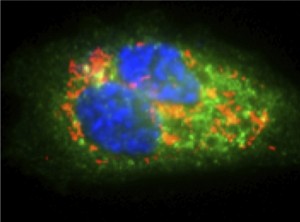A team of Illinois Institute of Technology researchers has discovered a powerful tumor suppressor found only in cancer cells, BaxΔ2, suggesting the possibility that the sick cells are generating a previously unknown protein to stop their growth. The discovery offers exciting possibilities for cancer prognosis and treatment. An article about the research, “BaxΔ2 Is a Novel Bax Isoform Unique to Microsatellite Unstable Tumors,” was published in the October 5, 2012 issue of the Journal of Biological Chemistry (287 (41)).
“This isn’t just another isoform. This is ‘out of bad comes good,’ a potential new approach to utilize mistakes made in cancer cells to restore gene function exclusively in cancer cells,” said Associate Professor of Biology Jialing Xiang, who leads the team that discovered BaxΔ2.
Bax is a key component in programmed cell death, which is a protective program to get rid of potentially cancerous cells in our body. Loss of Bax expression often leads to tumor formation and resistance to chemotherapy. Bax expression can be silenced by a common cancer mutation, called a “microsatellite deletion,” or by abnormal RNA splicing, which are both common occurrences in cancer. That means tumor suppressors like Bax are no longer expressed in the cell and can no longer protect the cell. During the IIT team’s study, Bonnie Haferkamp, who worked on the project for her Ph.D. thesis, surprisingly discovered that the combination of two “bad” things (microsatellite deletion and abnormal RNA splicing) led to production of this new Bax isoform, which is more powerful than the original Bax. Most importantly, tumor cells expressing BaxΔ2 seem selectively responsive to certain chemotherapeutic drugs.
According to Xiang, there are three major implications for the discovery. “First, we’re always looking for proteins produced solely in cancer cells. Here we’ve found a ‘clever’ one which already naturally exists in tumor cells. We just need to exploit it for cancer therapy.”
“Second, we can possibly use BaxΔ2 as a prognostic marker or to help a doctor to select chemotherapeutic drugs during cancer treatment. This means if cancer patients are BaxΔ2 positive, their prognosis might be better or they can be more effectively treated with certain chemotherapeutic drugs which are used for other cancers.”
“Third, this is only one of many genes frequently mutated in these types of tumors–which means it is very likely that other genes with microsatellite mutations previously thought to have lost their expression may also produce a cancer-specific form in cancer cells.”
The IIT team’s article in Journal of Biological Chemistry focuses primarily on how BaxΔ2 compares to normal Bax. Additional implications of this finding are explained in a future paper.

